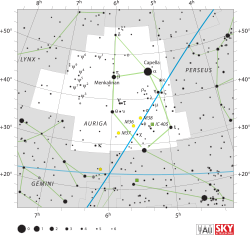Beta Aurigae
| Observation data Epoch J2000.0 Equinox J2000.0 |
|
|---|---|
| Constellation | Auriga |
| Right ascension | 05h 59m 31.72293s |
| Declination | +44° 56′ 50.7573″ |
| Apparent magnitude (V) | +1.90 |
| Characteristics | |
| Spectral type | A1m IV + A1m IV |
| U−B color index | +0.05 |
| B−V color index | +0.03 |
| R−I color index | –0.01 |
| Variable type | Algol variable |
| Astrometry | |
| Radial velocity (Rv) | –18.2 km/s |
| Proper motion (μ) |
RA: –56.44 mas/yr Dec.: –0.95 mas/yr |
| Parallax (π) | 40.21 ± 0.23mas |
| Distance | 81.1 ± 0.5 ly (24.9 ± 0.1 pc) |
| Absolute magnitude (MV) | 0.55/0.76 |
| Orbit | |
| Period (P) | 3.96004 days |
| Eccentricity (e) | 0.0 |
| Inclination (i) | 76.0 ± 0.4° |
| Periastron epoch (T) | 54539.0162 ± 0.0003 reduced HJD |
|
Semi-amplitude (K1) (primary) |
108.053 ± 0.072 km/s |
|
Semi-amplitude (K2) (secondary) |
110.911 ± 0.071 km/s |
| Details | |
| β Aur A | |
| Mass | 2.389 ± 0.013 M☉ |
| Radius | 2.77 R☉ |
| Luminosity | 48 L☉ |
| Surface gravity (log g) | 3.93 cgs |
| Temperature | 9,350 K |
| Rotational velocity (v sin i) | 33 km/s |
| Age | 570 Myr |
| β Aur B | |
| Mass | 2.327 ± 0.013 M☉ |
| Radius | 2.63 R☉ |
| Luminosity | 48 L☉ |
| Temperature | 9,200 K |
| Rotational velocity (v sin i) | 34 km/s |
| Other designations | |
| Database references | |
| SIMBAD | data |
Beta Aurigae (β Aurigae, abbreviated Beta Aur, β Aur), also named Menkalinan, is a binary star system in the northern constellation of Auriga. The combined apparent visual magnitude of the system is 1.9, making it the second brightest member of the constellation after Capella. Using the parallax measurements made during the Hipparcos mission, the distance to this star system can be estimated as 81.1 light-years (24.9 parsecs), give or take a half light year margin of error.
Beta Aurigae is the star's Bayer designation. The traditional name Menkalinan is derived from the Arabic منكب ذي العنان mankib ðī-l-‘inān "shoulder of the rein-holder". In 2016, the International Astronomical Union organized a Working Group on Star Names (WGSN) to catalog and standardize proper names for stars. The WGSN's first bulletin of July 2016 included a table of the first two batches of names approved by the WGSN; which included Menkalinan for this star.
It is known as 五車三 (the Third Star of the Five Chariots) in traditional Chinese astronomy.
Beta Aurigae is a binary star system, although the light that the star system releases forges the appearance of a single star in the night sky. The two brightest components are metallic-lined subgiant stars belonging to the A-type stellar classification; they have roughly the same mass and radius. A-type entities are hot stars that release a blue-white hued light; these two stars burn brighter and with more heat than the Sun, which is a G2-type main sequence star. The pair constitute an eclipsing spectroscopic binary; the combined apparent magnitude varies over a period of 3.96 days between +1.89 and +1.94, as every 47.5 hours one of the stars partially eclipses the other from Earth's perspective.
...
Wikipedia

